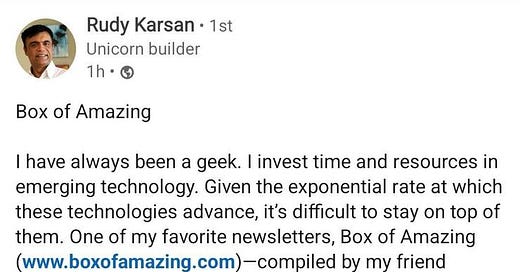The Fragility of Friendship
Must Reads
Last week, I touched on the downs of Spotify. The Hustle has broken down the ins and outs of the streaming industry with Spotify as the central point. The economics are eye-opening, especially when you see the general artist as a loser. The diversification of podcasts and other content is also intriguing. Spotify has spent nearly a billion dollars on content or companies associated with podcasts and podcasting is the main driver for why Spotify’s Q4 2021 revenue share from ads reached a record 15%. That share could rise to 30%-40% in the next 5-10 years.
On the Internet the journey is increasingly compressed into a single impression: you see an ad on Instagram, you click on it to find out more, you login with Shop Pay, and then you wonder what you were thinking when it shows up at your door a few days later. The loop for apps is even tighter: you see an ad, click an ‘Install’ button, and are playing a level just seconds later. Sure, there are things like re-targeting or list building, but by-and-large Internet advertising, particularly when it comes to Facebook, is almost all direct response. This can make for an exceptionally resilient business model: because the return-on-investment (ROI) of direct response advertising is measurable to a fantastically greater degree than traditional advertising measurement, advertisers can spend right up to the level they place on a particular customer or transaction’s value; Facebook, of course, is willing to help them do that as easily as possible, squeezing out margin in the process. Moreover, because these ads are sold at auction, the company is insulated from events like COVID or boycotts
Classifieds
The best conference of the year is TBD. Use this link to book or go here for more info: thetbdconference.com / Use 'BOXOFAMAZING33' to get 33% off.
Now
This long read is worth ten minutes of your time, with a lens on privacy. The story of Facebook/Meta is a complicated one only this week threatening to pull out of Europe due to a data-sharing dispute.
Near
We’re in the midst of a speculation boom that has been variously compared to the Beanie Babies craze, the dot-com bubble, and tulip mania. A year ago, the average person might never have heard the term Web3. Now we all have to watch as Paris Hilton beholds a cartoon-monkey NFT (non-fungible token) that Jimmy Fallon spent $216,000 on, then remarks, “I love the captain hat.” Stories about this new vision for the internet appear in the tech and business sections of national newspapers more or less every single day, generally with the caveat that a lot of people sincerely believe Web3 to be a Ponzi scheme, a grift, a multilevel-marketing arrangement, and a scam.
There has never been a more opportune time to have “money” as a hobby. Options trading, once the provenance of professional financiers, has soared with the rise of stock trading platforms like Robinhood, which makes it extraordinarily easy to buy and sell individual stocks. Stories of artists making hundreds of thousands on NFTs of their work and of cryptocurrency enthusiasts making bank buying and selling them have abounded over the past year. A wave of legalization of online sports betting has swept the country, and with it, lucrative promotions for first-time gamblers that offer what is essentially free money. Not only did the pandemic create a mass of people who were bored and restless, it also created some people with enough financial privilege to try something a little risky with their $1,400 stimulus check.
What to know about the new DeSci movement
End Note
Box of Amazing is made possible by some amazing advertisers. For more information and to secure a slot, fill in this form.
Forwarded this email? you can sign up at boxofamazing.com - it's free!
Are we connected on LinkedIn?




